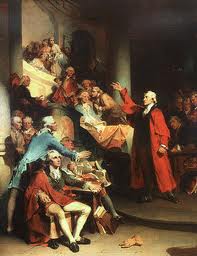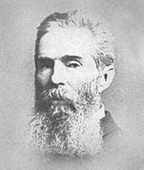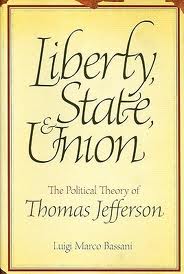
Were the Anti-Federalists Right?

I have found that sometimes "Forewords" and "Introductions" can be overlooked gems. From time to time on this site I will point out a Foreword or Introduction to a book. Recently, I was reminded that Joseph Sobran wrote the Foreword to an edition of The Anti-Federalists (Regnery, 1999). Sobran outlines what is really quite obvious: The Federalists have been proven wrong, and the Anti-Federalists have been proven right. The Anti-Federalists warned that if the Constitution was ratified it would lead to the consolidation and centralization of political power, and that the States would lose their liberty and their freedom to govern themselves. In short, they predicted the situation we now live in. Given the season, Sobran's wise words are worth pondering.
- Details
- Category: Recommended Reading Recommended Reading
- Published: 19 October 2012 19 October 2012
- Hits: 9103 9103
Peter Leithart on Voting
Peter Leithart is one of the sharpest writing theologians around today (imho). At recent post on his blog he asks a simple question: what is voting for? His answer is intriguing. He writes: "By our votes, we endorse a particular vision of national good that we want to see realized. Our votes declare what role we think civil power should play in our national good." He does not quite get to a difficult question: what if no candidate appears to offer a compelling vision of the national good that we think ought to be realized? You can read his whole piece here.
- Details
- Category: Recommended Reading Recommended Reading
- Published: 17 October 2012 17 October 2012
- Hits: 8470 8470
Herman Melville on Robert E. Lee

Herman Melville (1818-1891) published a number of poems related to the War Between the States. His Battle Pieces and Aspects of the War was published in 1866. A particularly interesting poem is "Lee in the Capitol." In this poem Melville "recreates" a scene--where Lee appears before a Reconstuction Committee of Congress (spring of 1866). Melville took what he called "poetical liberty" and wrote a poem about this event, and in the poem "recreates" Lee's testimony.
One of the most interesting aspects of the poem is where Melville poignantly points out the relationship (conceptually and principially) between George Washington and Robert E. Lee.
The key lines read as follows:
Who looks at Lee must think of Washington
In pain must think, and hide the thought,
So deep with grievous meaning it is fraught.
Indeed, when one "looks at Lee" one sees Washington, for Lee did what Washington would have done if Washington had been living in the 1860s: he would have defended his homeland against invasion. Lee was committed to the Union, and wanted to see it thrive and prosper. Lincoln had even asked Lee to play a leadership role in the Union army. However, once Lincoln raised troops for the purpose of invading the South, there was no real question of what a principled Virginian like Lee had to do. Lee, as he ought, chose to defend his land and family and neighbors against foreign invasion. I suspect that in the line above, "In pain must think, and hide the thought," Melville is closing in on a difficult reality: If there is that much similarity between Washington and Lee, then what does it mean to be an American? That is, if Lee was simply being faithful to the principles and realities of constitutional government, why would Lincoln invade Virginia? Is it possible that Lee was actually right? And if that is the case, it is tempting (and perhaps almost existentially necessary, in Melville's words) to "hide the thought." For, if Lee--and not Lincoln--was the true heir of the best of American thought and principles, the implications are quite grievous indeed.
- Details
- Category: Recommended Reading Recommended Reading
- Published: 14 October 2012 14 October 2012
- Hits: 8541 8541
Marco Bassani and the Political Theory of Thomas Jefferson

Luigi Marco Bassani has written a very good book, Liberty, State, and Union: The Political Theory of Thomas Jefferson. Originally published in 2010, the paperback edition was published in 2012. I have heard Bassani speak, and recently purchased and read the last 70 or so pages of the book. It is wonderful. Given that the War Between the States was being fought 150 years ago, there will be a lot of attention paid to that war, the nature of the American union, etc. The last chapter of Bassani's book is titled, "The Nature of the American Union: Jefferson and States' Rights." Many readers may be surprised to learn that Jefferson was one of the chief exponent of the notion of states' rights, which--on Jefferson's and Bassani's understanding--is simply the understanding embedded in the Constitution. Much of the chapter is committed to an explication and exploration of Jefferson's "Kentucky Resolutions" (1798), the most thorough extant writing we have where Jefferson outlines his understanding of the constitutional structure of the U.S. as a compact between the several states. For those desiring to read a good summary of Jefferson's understanding of the Constitution, these last 70 or so pages of Bassani's book (as well as the Kentucky Resolutions themselves) would be a good place to start. One can watch an interview with Bassani related to the book here.
- Details
- Category: Recommended Reading Recommended Reading
- Published: 13 October 2012 13 October 2012
- Hits: 6887 6887
Henri Blocher on God and the Cross

Over the years I have repeatedly benefitted from the theological labors of Henri Blocher. I am thankful for him and his labors. I am having my students read two of his essays on the atonment for a course I teach at Union University. The two essays are "Agnus Victor: The Atonement as Victory and Vicarious Punishment" and "God and the Cross." They are excellent essays, and one, "God and the Cross," is attached.
- Details
- Category: Recommended Reading Recommended Reading
- Published: 09 October 2012 09 October 2012
- Hits: 5540 5540
Political Patience and Christian Hope
I decided I would read this evening (both with my children, and after they went to bed, simply by the fire with a book), rather than watch the first presidential debate. My reasoning is simple: I love what the United States--at its best--stands for, and it is simply too sad to watch what passes for political discourse. At its best the U.S. is a republic with a Constitution. It is a confederation of quasi-independent states who have given limited authority to a federal government. Neither Mitt Romney nor Barack Obama are in the least committed to governing in accord with the charter document--the Constitution--of the United States. So we have a perverse situation: the rule of law is not respected in any meaningful sense by the two candidates representing the two main political parties in the United States. But we should not be too terribly surprised. Throughout history it appears that most people are quite happy to be ruled by tyrants. Even in the biblical period (as seen in 1 Samuel 8) the Israelites wanted to be oppressed by a king. We get the rulers we deserve, it would seem.
As I was reflecting on these things, I noticed a book review of a recent book by Morris Berman, Why America Failed: The Root of Imperial Decline (the review is written by Kirkpatrick Sale, and can be read here). A number of years ago I had purchased Berman's The Twilight of American Culture, and in picking it up this evening I enjoyed re-reading the following from the Introduction:
"[I]f you have finally had it with CNN and Hollywood and John Grisham and New Age 'spirituality,' then pull up a chair, unplug your phone (beeper, TV, fax machine, computer, etc.), and give me a few hours of your time. I promise to do my best not to entertain you" (p. 13).
A nice way to introduce a book on the "twilight of American culture." I note these two books by Berman because they both appear to have a common theme: the twilight, or even worse, the failure of America. If "failure" is taken to mean that America has ceased to be a republic that is ruled by law, then it would seem inescapable: America has failed.
And I raise that issue because if one follows the current political debate, it would seem that for many folks of a more conservative persuasion, it is understood that--as much as Romney may be less than the perfect candidate--good folks need to line up behind "our man". I certainly understand, I think, this line of reasoning. Obama has no interest in constitutional government, in terms of economics he is clearly a fascist, and wants to take money from you and me (by force), in order to fund the killing of unborn children. Fair enough. Perhaps the best thing is simply pull the lever and try to oust Obama. But then things get a tad difficult. Romney gives no evidence of any real understanding of the Constitutuion (or if he does understand it, he is not committed to governing in accord with the Constitution). He may be more committed to economic liberty, but is there any real reason to think that he will govern--even in the realm of economics--in accord with the Constitution? At least he appears to be more pro-life--a very good thing indeed. But at the end of the day, we are dealing with two men who give us no reason to believe they will govern in accord with the rule of law. As I noted in a recent essay, they are both still old-school revolutionaries.
So, when faced with a debate between two such persons, I will likely spend time with my children reading (we are currently finishing the first book in the Lord of the Rings trilogy), and then sit by the fire and read myself. After Berman, perhaps I will pick up a classic, Richard Weaver's Ideas Have Consequences. For some it may seem terribly inappropriate to point to America's decline, or twilight, or even failure. However, it used to be a staple of traditional conservative thought to try and get to the bottom of America's problems (or the West's problems more generally). Indeed, in Weaver's Ideas Have Consequences, the first line of the Introduction reads: "This is another book about the dissolution of the West." He then spends the entire book outlining his understanding of the problem before--in the final three chapters--outlining a suggestion for the "restoration of culture." I do not know if C.S. Lewis ever read Weaver, but Lewis would agree with Weaver on a central point. Lewis once responded to the accusation that one cannot "go back" to the past. Lewis said that if one has taken a wrong turn in the road, the most wise course is to go backward, find the place where you took a wrong turn, and to start heading in the right direction. In an American setting, the way forward will probably entail first going back, and discovering how and when the Constitution began to be abandoned. Neither candidate appears to understand the most basic issues of constitutional government, and is unwilling to truly affirm the basic constitutional framework--a confederated relationship of states who have given limited power to the federal government.
So, perhaps the best thing simply is to read Tolkien to my children--so they will over time not be seduced by Sauron and his minions. And then I may just keep reading Berman and Weaver and other folks who are trying to understand our current situation. And as a Christian I want to soak myself in Holy Scripture, and in the central writings of the Christian faith. It is completely possible that America has failed, although I certainly hope not. If one believes in the resurrection, one has to always believe that it is at least possible that this or that political entity can be renewed and revived, and that any political association can learn how to bow the knee to the risen Jesus (my hats off to Peter Leithart and Oliver O'Donovan). If God can make dead people walk, and if He can make bones come to life, He can certainly do the same thing in our day. He can certainly rule in such a way that we could see a radical transformation of our current situation. To diagnose our twilight or failure is a worthy project. But for the Christian failure is not the final word.
_______________________________
A version of this essay has also been published at The Imaginative Conservative.
- Details
- Category: Recommended Reading Recommended Reading
- Published: 04 October 2012 04 October 2012
- Hits: 5665 5665